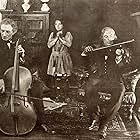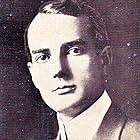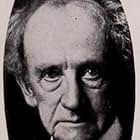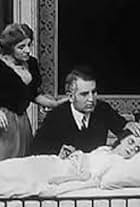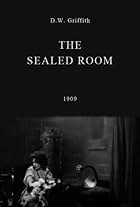Añade un argumento en tu idiomaA widowed father devotes his life to his daughter, who swears to stay with him forever. Then a handsome young man shows up and sweeps her off her feet.A widowed father devotes his life to his daughter, who swears to stay with him forever. Then a handsome young man shows up and sweeps her off her feet.A widowed father devotes his life to his daughter, who swears to stay with him forever. Then a handsome young man shows up and sweeps her off her feet.
- Dirección
- Guión
- Reparto principal
Imágenes
Reseñas destacadas
This sweet and simple Biograph short comes from the middle period in Griffith's career at the studio. Having spent most of 1909 developing his handling of action, he now began to turn his attention more and more to drama and poignancy.
Like many Griffith shorts from this period (see, for example The Unchanging Sea or The House with Closed Shutters), the story of As It Is in Life spans years and generations in its single-reel runtime. This cramming of lives into minutes can be a bit much, but Griffith's tactic in these cases (and it is particularly well-demonstrated here) is to familiarise us with a small number of locations and camera set-ups. Each of these has a particular context and can be used repeatedly down the years, as it were. As It Is in Life has three principle settings – the porch, the pigeon farm and the sweetheart's meeting place. In particular, the use of the latter for both the father's aborted romance and then the grown-up daughter's courtship makes the point that history is being repeated. The pigeon farm provides a unique and poetic backdrop for the tenderest moments between father and daughter, a sign of the increasing aestheticism of Griffith's work.
Although the Biograph shorts had made big strides towards naturalistic acting performances in the past year or so, there are still a few pantomimey exaggerated moments. However it's actually Griffith's arrangements and the fact that there were still a few problems of visual grammar that he had yet to iron out that are most jarring. When the father discovers his daughter with her young man – supposedly unobserved – he is in fact blundering about a few feet from them, which looks ridiculous. Fathers spying on lovers is a recurring image in Griffith's films, and they continue to do it from the same frame right up until 1914's The Avenging Conscience. It seems it was only in his longer features that Griffith learned to handle multiple camera set-ups in larger spaces.
Griffith's fascination for the generation-spanning short drama would only last another year or so. Really, the only excellent example of these that I have seen in Enoch Arden, and that at least was spread over too reels. For the most part his greatest one-reelers were tight, concentrated and focused.
Like many Griffith shorts from this period (see, for example The Unchanging Sea or The House with Closed Shutters), the story of As It Is in Life spans years and generations in its single-reel runtime. This cramming of lives into minutes can be a bit much, but Griffith's tactic in these cases (and it is particularly well-demonstrated here) is to familiarise us with a small number of locations and camera set-ups. Each of these has a particular context and can be used repeatedly down the years, as it were. As It Is in Life has three principle settings – the porch, the pigeon farm and the sweetheart's meeting place. In particular, the use of the latter for both the father's aborted romance and then the grown-up daughter's courtship makes the point that history is being repeated. The pigeon farm provides a unique and poetic backdrop for the tenderest moments between father and daughter, a sign of the increasing aestheticism of Griffith's work.
Although the Biograph shorts had made big strides towards naturalistic acting performances in the past year or so, there are still a few pantomimey exaggerated moments. However it's actually Griffith's arrangements and the fact that there were still a few problems of visual grammar that he had yet to iron out that are most jarring. When the father discovers his daughter with her young man – supposedly unobserved – he is in fact blundering about a few feet from them, which looks ridiculous. Fathers spying on lovers is a recurring image in Griffith's films, and they continue to do it from the same frame right up until 1914's The Avenging Conscience. It seems it was only in his longer features that Griffith learned to handle multiple camera set-ups in larger spaces.
Griffith's fascination for the generation-spanning short drama would only last another year or so. Really, the only excellent example of these that I have seen in Enoch Arden, and that at least was spread over too reels. For the most part his greatest one-reelers were tight, concentrated and focused.
What I like about this film is studying it as a time capsule of history. The story is basically of a father not able to marry another woman after his first wife's death because he can't afford to do so. He has a daughter to care for from his first marriage (when she grows up in the film she is played by Mary Pickford). So he sacrifices his happiness to raise his daughter. When she is an adult, and her father is old, she must choose to marry or stay and care for her father. She chooses to marry with some misgivings.. In the end, she brings her baby to see her father, and he finds joy in his grandchild. Imagine, in 1910, when the film was made, no one could run to the welfare office. People actually took responsibility seriously in caring for their kids and actually making huge sacrifices for their decisions in life. The father found a job, remained poor, but did the best he could. A college professor once told my history class that the baby boomers only think with "Me". Today, the father might have put the kid off on someone else, and done what they wanted to do. Look how many kids are raised without fathers today. This film is highly recommended, as a look at film study and a look at history. It is available on Griffith Biographs on Image Silent Classics laserdisc.
As It Is in Life (1910)
** 1/2 (out of 4)
A rather strange film from D.W. Griffith. A father sacrifices his own happiness in order to take care of his daughter. Years later the girl falls in love and chooses this man over her father, which leads dad into a state of depression. There's the typical Griffith melodrama on display here but I'm really not sure what he was going for in this film. I thought he was trying to tell another story of the poor, which works in the first part of the film but why the father would be so depressed that his daughter meets another man never plays out.
You can get this film through Grapevine as part of their D.W. Griffith: The Director series.
** 1/2 (out of 4)
A rather strange film from D.W. Griffith. A father sacrifices his own happiness in order to take care of his daughter. Years later the girl falls in love and chooses this man over her father, which leads dad into a state of depression. There's the typical Griffith melodrama on display here but I'm really not sure what he was going for in this film. I thought he was trying to tell another story of the poor, which works in the first part of the film but why the father would be so depressed that his daughter meets another man never plays out.
You can get this film through Grapevine as part of their D.W. Griffith: The Director series.
This is about the fifth D.W. Griffith short film I've seen recently and it doesn't compare as favorably with the others. Much of this is because there is some over-acting/over-gesticulating by one of the actors and it's odd Griffith didn't re-shoot the scenes. I say odd because usually the actors in his films behave much more naturally than what you see in most others of the era.
The story is about a man who dedicates his whole life to taking care of his daughter after his wife dies. He forsakes his own needs for her--and this is probably why he behaved so badly when his now grown daughter (Mary Pickford) decides to get married. Fortunately, this film illustrates that time heals all wounds or all's well that ends well or....
The bottom line is that the story is fair and Pickford and most of the rest act fine--but watch Dad (George Nichols) and see him have a seizure instead of act in a couple scenes!
The story is about a man who dedicates his whole life to taking care of his daughter after his wife dies. He forsakes his own needs for her--and this is probably why he behaved so badly when his now grown daughter (Mary Pickford) decides to get married. Fortunately, this film illustrates that time heals all wounds or all's well that ends well or....
The bottom line is that the story is fair and Pickford and most of the rest act fine--but watch Dad (George Nichols) and see him have a seizure instead of act in a couple scenes!
¿Sabías que...?
- ConexionesFeatured in Mary Pickford: A Life on Film (1997)
Selecciones populares
Inicia sesión para calificar y añadir a tu lista para recibir recomendaciones personalizadas
Detalles
- Duración16 minutos
- Color
- Mezcla de sonido
- Relación de aspecto
- 1.33 : 1
Contribuir a esta página
Sugerir un cambio o añadir el contenido que falta

Principal laguna de datos
What is the Spanish language plot outline for As It Is in Life (1910)?
Responde

